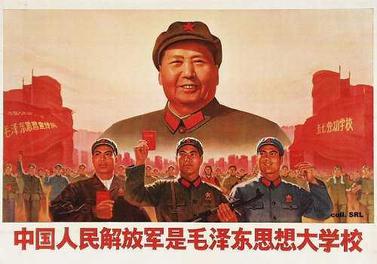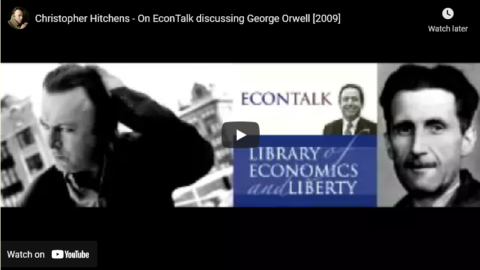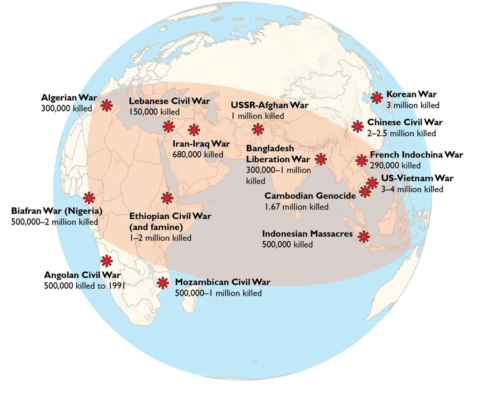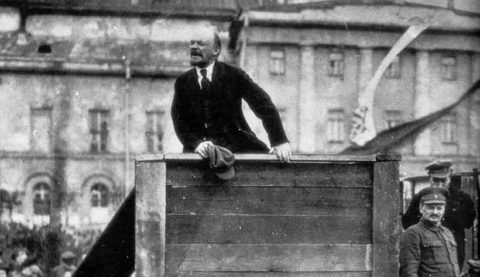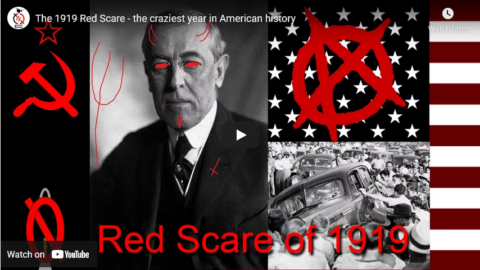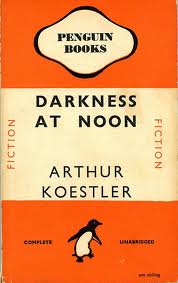Lenin is the same cold-blooded thug who famously wrote, “We must be ready to employ trickery, deceit, law-breaking, withholding and concealing truth[.] … We can and must write in a language which sows among the masses hate, revulsion, and scorn toward those who disagree with us.”
Elsewhere, Lenin declared that “The proletariat needs state power, the centralized organization of force, the organization of violence, for the purpose of crushing the resistance … and for the purpose of leading the great mass of the population … in the work of organizing a socialist economy.”
In August 1918, Lenin sent his now famous “Hanging Order” telegram. It instructed local Bolsheviks in the Penza region to deal harshly with the farmers (kulaks) who owned land there and were standing in the way of its nationalization. The British historian Robert Service discovered it in Soviet archives in the 1990s. It read as follows:
Comrades! The insurrection of five kulak districts should be pitilessly suppressed. The interests of the whole revolution require this because ‘the last decisive battle’ with the kulaks is now underway everywhere. An example must be made.
- Hang (absolutely hang, in full view of the people) no fewer than one hundred known kulaks, fatcats, bloodsuckers.
- Publish their names.
- Seize all grain from them.
- Designate hostages, in accordance with yesterday’s telegram.
Do it in such a fashion, that for hundreds of miles around the people see, tremble, know, shout: “The bloodsucking kulaks are being strangled and will be strangled.”
Telegraph receipt and implementation.
Yours, Lenin.
P.S. Use your toughest people for this.
That chilling telegram ushered in the “Red Terror” which murdered Russians by the tens of thousands over the next two years.
Lawrence W. Reed, “How Germany’s ‘Deal With the Devil’ Backfired and Changed History”, Foundation for Economic Education, 2021-04-16.
July 20, 2021
QotD: Lenin’s “Hanging Order”
July 13, 2021
June 27, 2021
QotD: Being right at the wrong time
There is a curious phenomenon in Western intellectual life, namely that of being right at the wrong time. To be right at the wrong time is far, far worse than having been wrong for decades on end. In the estimation of many intellectuals, to be right at the wrong time is the worst possible social faux pas; like telling an off-colour joke at the throning of a bishop. In short, it is in unforgivable bad taste.
There was never a good time, for example, to be anti-communist. Those who early warned of the dangers of bolshevism were regarded as lacking in compassion for the suffering of the masses under tsarism, as well as lacking the necessary imagination to “build” a better world. Then came the phase of denial of the crimes of communism, when to base one’s anti-communism on such phenomena as organised famine and the murder of millions was regarded as the malicious acceptance of ideologically-inspired lies and calumnies. When finally the catastrophic failure of communism could no longer be disguised, and all the supposed lies were acknowledged to have been true, to be anti-communist became tasteless in a different way: it was harping on pointlessly about what everyone had always known to be the case. The only good anti-communist was a mute anti-communist.
Anthony Daniels, “Authoritarianism in Cement and Steel”, Quadrant, 2018-11-04.
June 10, 2021
QotD: “Defending” democracy using totalitarian methods
One of the peculiar phenomena of our time is the renegade Liberal. Over and above the familiar Marxist claim that “bourgeois liberty” is an illusion, there is now a widespread tendency to argue that one can only defend democracy by totalitarian methods. If one loves democracy, the argument runs, one must crush its enemies by no matter what means. And who are its enemies? It always appears that they are not only those who attack it openly and consciously, but those who “objectively” endanger it by spreading mistaken doctrines. In other words, defending democracy involves destroying all independence of thought. This argument was used, for instance, to justify the Russian purges. The most ardent Russophile hardly believed that all of the victims were guilty of all the things they were accused of: but by holding heretical opinions they “objectively” harmed the régime, and therefore it was quite right not only to massacre them but to discredit them by false accusations. The same argument was used to justify the quite conscious lying that went on in the leftwing press about the Trotskyists and other Republican minorities in the Spanish civil war. And it was used again as a reason for yelping against habeas corpus when Mosley was released in 1943.
These people don’t see that if you encourage totalitarian methods, the time may come when they will be used against you instead of for you. Make a habit of imprisoning Fascists without trial, and perhaps the process won’t stop at Fascists. Soon after the suppressed Daily Worker had been reinstated, I was lecturing to a workingmen’s college in South London. The audience were working-class and lower-middle class intellectuals — the same sort of audience that one used to meet at Left Book Club branches. The lecture had touched on the freedom of the press, and at the end, to my astonishment, several questioners stood up and asked me: Did I not think that the lifting of the ban on the Daily Worker was a great mistake? When asked why, they said that it was a paper of doubtful loyalty and ought not to be tolerated in war time. I found myself defending the Daily Worker, which has gone out of its way to libel me more than once. But where had these people learned this essentially totalitarian outlook? Pretty certainly they had learned it from the Communists themselves! Tolerance and decency are deeply rooted in England, but they are not indestructible, and they have to be kept alive partly by conscious effort. The result of preaching totalitarian doctrines is to weaken the instinct by means of which free peoples know what is or is not dangerous. The case of Mosley illustrates this. In 1940 it was perfectly right to intern Mosley, whether or not he had committed any technical crime. We were fighting for our lives and could not allow a possible quisling to go free. To keep him shut up, without trial, in 1943 was an outrage. The general failure to see this was a bad symptom, though it is true that the agitation against Mosley’s release was partly factitious and partly a rationalisation of other discontents. But how much of the present slide towards Fascist ways of thought is traceable to the “anti-Fascism” of the past ten years and the unscrupulousness it has entailed?
George Orwell, Unpublished Preface to Animal Farm, 1945.
June 6, 2021
QotD: The Soviet Union in the Cold War, China today
Back in the days of the Cold War, much was said about the titanic power of the Soviet Union. The USSR, we were told, was a superpower the equal of the United States, possibly even superior. This meme was spread by lefties who wanted the USSR to win, by sincere pacifists hoping to stop war before it could begin, and by an enormous cohort of liberals who repeated it because they heard it from the first two. (Much liberalism can be explained this way. It’s the ultimate “I heard it from somebody” ideology.)
Needless to say, it was gibbering nonsense. The late ’80s Soviet collapse revealed that the USSR was never any kind of power at all – an economy that didn’t produce, weapons that didn’t work, a populace addicted to drink and overwhelmed with despair. “Bulgaria with nukes” is how someone characterized it, and truer words were never spoken. That remains the case today, despite Vlad Putin’s chest-beating, and it’s likely to remain the case as far ahead as anyone can see.
The same trope is being repeated regarding China. China, we are told, is the coming nation. The second largest economy on Earth, soon to be the first. A billion and a half people, each more educated than any American; a military power second to none, with advanced weapons of a nature that we can only gape at. A country exercising its power over vast reaches of the Pacific and moving into the Indian Ocean, Africa, and the Mideast with no one to oppose it.
We hear this from the likes of Thomas Friedman, who has spent much of his career looking for his personal Mussolini. It’s repeated by deeper figures across the political spectrum. In fact, it can be said without exaggeration to have become received wisdom.
There’s no point in asking how true this is. The proper question to ask is whether it embodies any truth at all.
J.R. Dunn, “The Myth of China as Superpower”, American Thinker, 2019-01-09.
May 17, 2021
Christopher Hitchens – On EconTalk discussing George Orwell [2009]
CaNANDian
Published 25 Sep 2012Christopher Hitchens talked with EconTalk host Russ Roberts about George Orwell. Drawing on his book Why Orwell Matters, Hitchens talked about Orwell’s opposition to imperialism, fascism, and Stalinism, his moral courage, and his devotion to language. Along the way, Hitchens made the case for why Orwell matters.
Download audio: http://www.econtalk.org/archives/2009…
May 6, 2021
Cold War 2: Electric Dumbaloo
Seva Gunisky at Hegemon has some thoughts on the undeclared-but-real new Cold War between the Peoples’ Republic Of China and what remains of the “west”:
Last week I discussed some reasons for and against the label of “Cold War” to describe US-Chinese relations, but mostly ignored the ethical implications of this debate. Since then I’ve encountered some genuinely terrible takes on the subject, so I wanted to expand on the idea just a bit.
One thing I failed to mention is how the presence of Chinese-Americans in the US — something largely missing during the first Cold War — complicates the debate. If you’re a China dove, one argument might be that any criticism of China’s regime amounts to racism against Chinese-Americans …
I’ve worked with many people with Chinese ancestry and people who came to Canada quite recently (in the software business it’d be hard to avoid working with folks from former and current communist countries), so I’ve always tried to be as careful as possible to couch my criticism of China — the PRC — to ensure that even a casual reader is clear that I’m against the government and their system, not individual people from China. It doesn’t always work, because for too many people these days, everything has to be viewed through a racist lens and anything that might possibly look or sound like racism must therefore absolutely be racism.
I think this argument can be taken too far, and used as a cheap way to shield China’s regime from legitimate criticism. As Alex Hazanov points out, it’s the same patronizing conflation people make when arguing that any criticism of Israel must be an attack on American Jews.
The doves are right, however, that the presence of nearly four million Chinese-Americans makes cold war discourse more fraught than the first time around, when the Soviets were “white” and safely far away. Official statements and attitudes will have to take special care, but in general the US does not have a great history in this regard. I fully expect reactionary cranks to demand that Chinese-Americans publicly and ritualistically denounce the Chinese government. Still, I hope it should be obvious that characterizing any critique of China’s government as “imperialist” or “sinophobic” is silly.
But brace yourselves for the shitstorm of dumb that will accompany this (hopefully cold) geostrategic conflict:
Take first Cold War discourse, add a dash of racism, filter it through social media, and you are beginning to get a sense of how dumb the debates are going to be.
[…]
And if we are going to pick a cold war “doctrine”, we should consider that neither Russia or China is looking great in the medium run. It seems that despite its supposed efficiency the Chinese regime is unable to resolve the information problem common in closed regimes, that regime personalization under Xi has worsened the problem, and that this, combined with structural/demographic problems, means the Chinese regime has a rough road ahead in the next 10-30 years.
If so, the best policy for US is certainly to avoid head-on confrontation in favor of something like neo-containment. But that’s another conversation.
H/T to Colby Cosh for the link.
April 21, 2021
“The error in Western thinking was to view CCP officials as civilised counterparts”
In Quillette, Aaron Sarin traces the last twenty years of successful diplomacy, industrial espionage, and ever-increasing CCP media influence in China’s relationships with western nations:
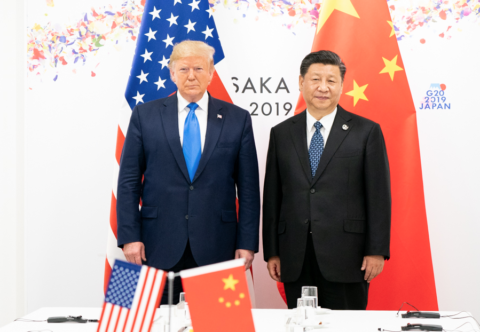
President Donald Trump and PRC President Xi Jinping at the G20 Japan Summit in Osaka, 29 June, 2019.
Cropped from an official White House photo by Shealah Craighead via Wikimedia Commons.
By the end of 2020, China’s relationships with the US and Australia had reached their lowest point in living memory, while Sino-British relations weren’t far behind. Yet the European Commission chose this moment to sign a major new investment treaty with Beijing. The deal appeared to have been rushed to completion just before Joe Biden’s inauguration, as if to avoid the fuss that a new American administration would be sure to make. Indeed, incoming National Security Adviser Jake Sullivan felt sore enough to send a pointed tweet: “The Biden-Harris administration would welcome early consultations with our European partners on our common concerns about China’s economic practices.”
The truth is that Brussels has been drifting further and further from Washington ever since the election of Donald Trump, and there are few signs the winds will change now that Biden has taken office. In 2017, Merkel said that Europe could no longer rely on America. By 2020, it seemed truer to say that Europe would rely on China from now on. Indeed, diplomats like Emmanuel Bonne (Macron’s foreign policy adviser) have been most enthusiastic about “France’s readiness to step up strategic communication with China.” In his gushing deference, Bonne can sometimes sound like a man with a gun to his head: “France respects China’s sovereignty, appreciates the sensitivity of Hong Kong-related issues, and has no intention of interfering in Hong Kong affairs.” There are times when the language of neutrality reveals with painful clarity that a side has been chosen.
Brussels officials talk of “strategic autonomy,” of course. They hope to carve out a path to self-sufficiency while at the same time enjoying mutually beneficial relationships with partners like Beijing. The problem is that mutually beneficial relationships are not possible with predators. As successive American administrations have found, those who maintain close connections with the Communist Party will eventually suffer large-scale intellectual property theft and the loss of millions of manufacturing jobs.
Brussels can hardly expect that Beijing will respect this new agreement. Recall the various promises that were made regarding Hong Kong: all of them were broken. Party officials may have signed a legal document recognising the city’s special administrative status, but this was purely for show. In 2017, having apparently now ascended to a position above the law, they declared that the document had “no practical significance.” Remember how Barack Obama was given firm assurance that Beijing would never militarize the South China Sea? There were handshakes and smiles all round, and then Beijing proceeded to militarize the South China Sea.
Indeed, some of the commitments included as part of the new deal echo those made 20 years ago, when China first joined the World Trade Organisation. It was agreed in 2001 that prices in every sector would be determined by market forces; that state-owned enterprises would begin operating free of state influence; that international norms regarding intellectual property would be respected; and so on. After two decades, we can see that the Communist Party has kept not one of its promises.
The error in Western thinking was to view CCP officials as civilised counterparts. We failed to see that we were dealing with a pack of thugs and grifters — men for whom the rule of law is neither reality nor ideal, but façade. This lesson has now been learned in some quarters, but clearly not in the upper echelons of the European Union. This new investment deal even includes a reference to “commitments on forced labour,” which is little short of an insult when we consider the hundreds of thousands of Uyghurs who have been made to toil all day till dusk in the cotton fields of Xinjiang. The truth is that the EU has been fooled. There will be no “win-win situation.” Not when dealing with the Communist Party, which has always viewed geopolitics as a zero-sum game. In the words of Bilahari Kausikan, once Singapore’s top diplomat, “only the irredeemably corrupt or the terminally naïve take seriously Beijing’s rhetoric about a ‘community of common destiny.'”
April 15, 2021
QotD: The “evil” of profits
The slogan into which the Nazis condensed their economic philosophy, viz., Gemeinnutz geht vor Eigennutz (i.e., the commonweal ranks above private profit), is likewise the idea underlying the American New Deal and the Soviet management of economic affairs. It implies that profit-seeking business harms the vital interests of the immense majority, and that it is the sacred duty of popular government to prevent the emergence of profits by public control of production and distribution.
Ludwig von Mises, Planned Chaos, 1947.
April 12, 2021
“War Communism” in the Soviet Union, 1917-1921
J.W. Rich outlines the economic and humanitarian disaster of Soviet “War Communism” that eventually forced Lenin to bring back some limited elements of capitalism to save the country:
In 1917, the Bolsheviks seized power in Moscow after the deposition of the democratic provisional government which had replaced the Tsar. However, the Bolsheviks’ hold on power was far from secure. There was little affection anywhere for the Tsar, but there was no agreement on what form of government should replace the monarchy. Bolshevism had been on the rise for years, but ideas of democracy and liberalism were gaining popularity as well. Shortly after the 1917 revolution, the Russian Civil War broke out between the Reds, the Bolsheviks, and the Whites, a coalition of anti-Bolsheviks that were generally democratic.
Through the course of the civil war, the Bolsheviks gained more power and control over increasingly large amounts of Russia. With this control, they began to implement their Marxist economic ideas into reality. On January 28, 1918, it was decreed that all factories should be directed by state-appointed managers. In effect, this amounted to a near-complete nationalization of industry. In one fell swoop, the vast majority of the production of Russia’s consumer goods was now under the purview and direction of the state.
On May 9, 1918, a grain monopoly was announced over grain production in the country. All grain harvested across the country was now the property of the state. This was extended even further when a general food levy was announced in January 1919. Any and all food was now the property of the state. In addition, local farm authorities were no longer allowed to set the levy based on harvest estimates. In essence, the state would take however much it wanted from the peasants without any concern if they had enough food to feed themselves and their families.
It was at this point that large-scale forced rationing was introduced. Money was made worthless overnight as ration cards were mandated to the entire population. No longer could you buy whatever you wished with the money you had. The goods allocated for you were predetermined on your ration card.
By late 1920, going into 1921, the Russian Civil War was all but over. The Whites had been soundly defeated by the Reds, giving the Bolsheviks control of nearly the entirety of the country. However, despite the victory in the Civil War, the economy at home was beginning to fall apart. Industrial production was at 20% of pre-war levels by 1920. As a result of this lagging production, there were few goods in the cities available. This resulted in a flight from the cities to the countryside. From 1918 to 1920, eight million people emigrated from the cities to the villages, where there was better hope of finding food or some goods. In Moscow and Petrograd, the population declined by 58.2%
The agricultural situation was not much better. Sheldon Richman records that from 1909-1913, gross agricultural output averaged 69 million tons. By 1921, it was just 31 million. From 1909-1913, sown area was over 224 million acres. In 1921, only 158 million acres were sown. This lack of food resulted in a mass loss of population. From 1917 to 1922, the entire population declined by 16 million, not counting immigration and deaths from the civil war.
War Communism was now fully implemented and the Marxist aspirations of Lenin and the Bolsheviks were now fulfilled. For the people that had to live under War Communism, however, the conditions had become intolerable. In February 1921, labor strikes began to emerge all over Russia. With the end of the civil war and living standards continuing to fall, resistance to the Bolsheviks began to spread throughout the country. Moscow was the first city to strike, with other large cities, such as Petrograd, following. The protestors demanded an end to War Communism and a restoration of private enterprise and civil liberties, such as the freedom of speech and assembly.
The protests escalated when the Kronstadt Naval Base mutinied against the government. Once a bastion of Bolshevik support and fervor, the sailors joined with the laborers in demanding reform and change. A force led by Trotsky was dispatched to deal with the mutiny, but Lenin knew that change was needed. The writing was on the wall for War Communism.
April 5, 2021
The 1919 Red Scare – the craziest year in American history
The Cynical Historian
Published 19 May 2016Many people have heard of the first Red Scare, but we should look at the year of 1919 more thoroughly. It’s probably the craziest one in American history.
Ann Hagedorn, Savage Peace: Hope and Fear in America, 1919 (New York: Simon & Schuster Paperbacks, 2007). https://amzn.to/2NHIcaT
————————————————————
contribute to my Patreon:
https://www.patreon.com/CynicalHistorianLET’S CONNECT:
https://twitter.com/Cynical_History
————————————————————
wiki:
The First Red Scare was a period during the early 20th-century history of the United States marked by a widespread fear of Bolshevism and anarchism, due to real and imagined events; real events included those such as the Russian Revolution. At its height in 1919–1920, concerns over the effects of radical political agitation in American society and the alleged spread of communism and anarchism in the American labor movement fueled a general sense of paranoia.The Scare had its origins in the hyper-nationalism of World War I as well as the Russian Revolution. At the war’s end, following the October Revolution, American authorities saw the threat of Communist revolution in the actions of organized labor, including such disparate cases as the Seattle General Strike and the Boston Police Strike and then in the bombing campaign directed by anarchist groups at political and business leaders. Fueled by labor unrest and the anarchist bombings, and then spurred on by United States Attorney General A. Mitchell Palmer’s attempt to suppress radical organizations, it was characterized by exaggerated rhetoric, illegal search and seizures, unwarranted arrests and detentions, and the deportation of several hundred suspected radicals and anarchists. In addition, the growing anti-immigration nativism movement among Americans viewed increasing immigration from Southern Europe and Eastern Europe as a threat to American political and social stability.
Bolshevism and the threat of a Communist-inspired revolution in the U.S. became the overriding explanation for challenges to the social order, even such largely unrelated events as incidents of interracial violence. Fear of radicalism was used to explain the suppression of freedom of expression in form of display of certain flags and banners. The First Red Scare effectively ended in mid-1920, after Attorney General Palmer forecast a massive radical uprising on May Day and the day passed without incident.
————————————————————
Hashtags: #History #1919 #RedScare #SpanishFlu #Bolshevism #BlackSox #strikes #WoodrowWilson #LeagueOfNations #prohibition #suffrage
[Note: this was filmed in 2016 … I think 2020 has now taken the mantle of “craziest year”. Unless 2021 doubles down all the weirdness of 2020.]
February 1, 2021
QotD: “Useless things … do not further The Revolution”
“Fat acceptance,” slutwalks, and all the rest of it follow naturally from Bolshie beliefs. If you accept — as a good little Dialectical Materialist must — that there’s nothing to human happiness but bread, shoes, and shit, ugliness — physical, moral, mental — becomes a good in itself. How could it be otherwise? Only truly useless things can be beautiful, and useless things, by definition, do not further The Revolution.
Too bad for the Bolshies that it’s in our nature to confuse the messenger with the message. I like to think of myself as an open-minded, tolerant man who takes things as they come, but holy jeeebus, I don’t care what Emma Goldman’s deal is — if she’s for it, I’m against it. I need bleach for my eyes.
We need to use that. It’s no coincidence that Ashley Judd and now Taylor Swift are spouting off about Progtard politics — they used to be cute; now they’re not. See what Social Justice does to you, ladies?
Severian, “The Face You Deserve”, Rotten Chestnuts, 2018-10-11.
January 3, 2021
Arthur Koestler’s Darkness at Noon ranks with Orwell’s Nineteen Eighty-Four
James E. Hartley on why Koestler’s 1941 novel should be seen as a prescient guide to modern-day “wokeness”:
The puzzling thing about wokeness is not that it is fashionable among a small subset of the Campus Left. One should never be surprised by what is fashionable among college faculty and students. The curious question is how these ideas broke out of the academic asylum and met acquiescence among a large group of people who should have known better.
The answer is found in a book which should have never fallen off the radar: Arthur Koestler’s Darkness at Noon. First published in 1941, it was — along with 1984 — one of the great books about totalitarianism written in the 1940s. Widely praised when it was published, the book was enormously influential in fostering the consensus view of post-war anti-communism. In 1998, Modern Library published a list of the 100 best English novels of the 20th century; Darkness at Noon was ranked eighth, five places above 1984.
The plot of the novel itself is fairly simple. The story begins with the imprisonment of Nicholas Rubashov, one of the heroes of the communist revolution in a country which is clearly the Soviet Union. Decades after the revolution, Number 1 (read: Stalin) has assumed power. Rubashov is imprisoned on the absurdly false charges of plotting to kill Number 1. The entire novel takes place in prison, as Rubashov is interrogated and eventually comes to voluntarily confess at a public trial to crimes he did not commit. He is then shot.
The novel explores the philosophical puzzle of why Rubashov would join with what has obviously become a murderous cult run by a totalitarian who is solely interested in amassing enough power to stamp his will upon the whole country. Rubashov, a devoted communist to the end, abandons his principles and bit by bit comes to accede to demands of the new generation who are seeking scapegoats and ritualistic confessions of guilt.
What is the nature of the new generation? One of the Party officials interrogating Rubashov explains:
There are only two conceptions of human ethics, and they are at opposite poles. One of them is Christian and humane, declares the individual to be sacrosanct, and asserts that the rules of arithmetic are not to be applied to human units. The other starts from the basic principle that a collective aim justifies all means, and not only allows, but demands, that the individual should in every way be subordinated and sacrificed to the community — which may dispose of it as an experimentation rabbit or a sacrificial lamb.
The individual does not matter. The group matters. What is good for the group is by definition good, regardless of whether it is good for the individual. As the interrogators make abundantly clear, no individual has the right to stand in the way of the group. The Party represents the group, and thus no individual has the right to oppose the Party.
November 30, 2020
Malayan Emergency 1948-1960
The Cold War
Published 28 Sep 2019Our series on the history of the Cold War period continues with a documentary on Malayan Emergency of 1948-1960 during which the British empire was challenged by the emerging Malayan Communist Party. These events led to the independence of Malaya.
Consider supporting us on Patreon: https://www.patreon.com/thecoldwar
November 29, 2020
QotD: The succession problem of totalitarian leadership
Back in the Cold War, prudent Kremlinologists had to take the marked decline in the Politburo’s collective intelligence very seriously indeed (the old adage “never attribute to malice what is adequately explained by stupidity” is terrifying when the potentially malicious dumbasses have nuclear missiles).
There were two main reasons for the decline, both structural. The first, of course, is Communism itself. A totally ideologized society is a society totally committed to make-believe. You could fill a good-sized book listing the catastrophes make-believe caused the USSR. Just to take the most obvious: Hitler did everything but send the Goodyear Blimp over Moscow, towing a banner announcing his invasion plans. But since everyone who accurately reported the goings-on in Poland ended up in the Gulag, the Wehrmacht walked right on in.
The second has to do with the nature of totalitarian leadership. Obviously sharing power is out of the question, so every Boss who finally claws his way to the top ruthlessly purges everyone who could conceivably challenge him. The purged are replaced by yes-men and toadies, who immediately enact mini-purges of their own inside their new departments. It doesn’t take more than a few rounds of this for smarter functionaries to learn to dig themselves in very, very deep, disguising themselves in a kind of protective stupidity. A few more rounds, and “protective stupidity” drops the modifier, as anyone with anything on the ball has decamped for the safer — and, not coincidentally, very soon much more profitable — havens of technical management.
It doesn’t take long before your “leadership” is nothing but ideology-addled dimbulbs. Sound familiar?
Severian, “How Dumb Are Liberals?”, Rotten Chestnuts, 2020-07-31.

